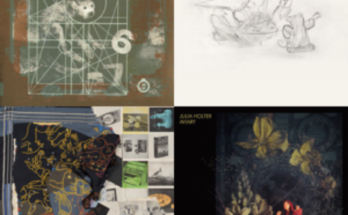Rjyan Kidwell is (at least partially) Cex. But just what is Cex? If you were thinking the alternative spelling is to avoid the censor, you wouldn’t be that far off. Growing up Catholic in the Baltimore suburb of Phoenix, Md., Kidwell found himself obsessed with sex and unable to understand why. “The thing about this world is that everything is about getting fucked,” or at least “weird sublimations of that desire.” Sex being “always the biggest thing out there,” why not name your band after it? “What’s bigger than naming your band after sex? It’s bigger than God.” The additional appeal is how it violates, or at least flouts, the rules of what’s acceptable for people, albeit subversively. “You’re not allowed to name something after sex…you become a perv.” Then again, the sex drive can be a “scary thing” to people; just note how “We do crazy things to overcompensate” for our embarrassment.
When he’s not thinking about the Great Unmentionable, Cex is making incredible music. Splitting his time between the laptop (though he doesn’t sit down), the guitar and even the mic, he’s been putting his contemporaries in their place for years. DIY means a lot to Cex-he started his own Tigerbeat6 label at the tender age of 19. The way he describes the world today is an effective description for his music: “Everything up in the air. Throw everything up and take a picture like a weird Salvador Dali.” That’s not to say it’s uncalculated, though; in fact it’s designed to interface with the world we’re in. We live in a “post-modern, post-electroclash, post-Pitchforkmedia-reviewing Jay-Z world.” The level of sophistication has increased drastically and in the music business, “your level of obsession is your level of success.” Kidwell talks about how touched he was reading “Heavier Than Heaven,” a biography of Kurt Cobain. “He was a guy with problems,” but because of his suburban upbringing, “he felt that they weren’t cool problems.” The rest is history-Cobain turned his anguish into some of the most fascinating music of our decade. That’s an approach Kidwell uses as well. He not only makes music because he’s “real lazy” but because it’s his way to take things he can’t speak himself and live them in his music, as an extension of his life.
What we lack right now says Rjyan, is art with a “strong spiritual imperative.” He notes that modern American imperialism causes other parts of the empire to “become rotten.” What we need, he concludes, is to “bring back the shaman” in modern music. As Kidwell realized, John Lennon pales in comparison to the heroicism represented by Martin Luther King, Jr. but for a pasty white kid from the suburbs, “rock star” is the only hero profession left. The only other option is playing the system, which, says Kidwell, requires intense amounts of cynicism-“you have to be ruthless.” In direct contrast, the musician is one who voluntarily decides that they don’t want the world to be so sad and work from there. That’s the sort of role Cex strives to fill.
Rjyan isn’t one to rest on his haunches. He’s recently expanded Cex to include two new members. His wife Roby Newton of Weather (formerly of Milemarker) appears on vocals and “the instrument,” a homemade two-string bass. Cale Parks of Aloha (also Joan of Arc) provides drums and piano as well. However, the additional members don’t make the music busier, Kidwell insists. Instead, he’s focused on “making everything that happens important,” meaning there’s more space in the music than ever. His plan has been “getting together some of [his] friends with serious chops and allowing them to improv” in the space provided; it makes “everything more Donald Fagen-y.” “With the climate of the planet being what it is, people need direct music,” Kidwell notes, which sometimes means paying tribute to the past. Now, it can be said that Cex no longer refers to Rjyan alone, but he points out that “it’s not done by far. Until it’s done it’ll be hard to summarize or encapsulate.” All that remains is “a common thread running through all the Cex albums, and that thread is that there are no rules, no code, no honor.”
“Music has no bible. There are a lot of Pharisees preaching to people about the way it should be. No one can ever write the music bible. Who’d write it, music critics? What makes a person a music critic? You become a critic when you decide you’re one. That’s like letting the police write the laws. That’d be a fucked-up world.” But then again, “that’s what we’re getting a taste of today” in America. “If there’s one band consistently doing `the wrong thing,’ then that’s probably a useful band to have around.”
Not only has Rjyan created a new band, there’s a new Cex album coming out in March, entitled Invisible Sidis. It features collaborations from indie It-boy Ben Gibbard (Postal Service, Death Cab for Cutie) and Portland “afro-funk” duo Nice Nice. Kidwell refers to the sound with the bewildering combination of “Red Hot Chili Peppers meets Low,” so who knows what to expect? The last record, Rjyan says, “was about killing myself, about being so miserable…I don’t want to sing no more in first person.”
Cex will be appearing with opening acts Aloha and Weather this Friday at The Canopy Club. Tickets are $8, and the show begins at 9 p.m. Local live hip hop group Apollo Project will be playing a special midnight show afterwards; the cover for that show is $3.



